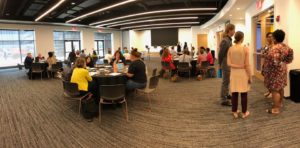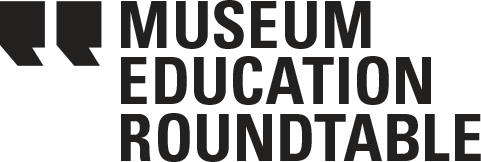Notes from the Field: Reflections on MER’s 2019 Forum
Just over a month ago, MER Board of Directors met in St. Louis for our annual retreat and forum for local museum educators. Each year, when choosing the theme, we take stock of current trends in the field and how they intersect with local conversations/issues.
On August 6, 2019, the MER Forum hosted educators for a panel/workshop called Museums as Partners in Racial Equity Work. Chosen to speak on the panel were St. Louis professionals in a variety of fields whose equity work could help to answer questions, including “What can museum educators learn from the significant work and expertise of leaders from other sectors such as education, health and wellness, and government?”
In this post, we follow up with the panel’s co-moderators, Dr. Kira Banks, Associate Professor of Psychology at Saint Louis University and Braden Paynter, Program Manager, International Coalition of Sites of Conscience. In their answers, they struck a balance between the need for internal work in our organizations (and ourselves) as well as the importance of learning techniques and best practices from other fields.

What do you hope people took away from the panel conversation?
Kira: I hope people took away a clear understanding of the differences between diversity and awareness work and equity work. Efforts across the grid are needed, and hopefully the panel helped illuminate examples and spur thinking about how participants can contribute to the work in their own spheres of influence.
Braden: One, I hope people met someone new from the museum community they want to continue this work with. Two, I hope they heard someone from the non-museum world they want to continue listening to. Three, that they are able to apply Dr. Banks’ rubric of awareness, understanding, transformation to analyze multiple situations (click here to access the worksheet). Four, that listening to the panelists they have a new idea they will use for their next step in this.
Are there ways that you have seen your field of work shift in regards to equity work? Has this been influenced by outside actors, or has it primarily been driven from internal efforts?
Braden: As with most things, I think it is both. A big challenge for our field is that what should be the internal has been made the external for far too long. We’ve excluded so many people and groups from voice and power in our spaces of learning that a chunk of our work is about shifting lines of external and internal. And to use the framework we set up during the panel, not surprisingly, as a field we are better (with a lot of work to do) on the awareness end than the transformation end. I hope everyone who came to the panel will continue to help move their institutions onto the rubric and then work through it.
Want to learn more? You might be interested in reading “How Can Museums Become a Home for Newcomers?” by Patricia Lannes.
Dr. Kira Banks has been working to support individuals and groups to understand themselves, others and systems of oppression for over 20 years. She is an Associate Professor in the Department of Psychology at Saint Louis University. Her research examines the experience of discrimination, its impact on mental health and intergroup relations. Banks has published over 20 articles in peer-reviewed outlets including American Psychological Association journals such as American Psychologist, Cultural Diversity and Ethnic Minority Psychology, and Journal of Diversity in Higher Education. She has also contributed to The Harvard Business Review and popular media outlets such as Huffington Post and The Atlantic. Banks’ expertise was sought after and she served as a racial equity consultant for the Ferguson Commission. Her thinking and writing has helped frame racial equity in the St. Louis region, and she takes this work beyond through her work as the host of the podcast “Raising Equity.” Banks received her BA from Mount Holyoke College, where she was inducted into Phi Beta Kappa, and her MA and PhD from the University of Michigan.
Braden Paynter is the Program Manager for Methodology and Practice at Sites of Consciousness and on the Board of Directors of Museum Education Roundtable. He helps good ideas move around the world, in particular by supporting members in developing programming, exhibitions and community engagement strategies. Braden has trained dozens of organizations in dialogue, community engagement, and planning. Currently leading the Coalition’s work on engaging with young learners, Braden’s past work has focused on using public education spaces to connect people to each other and the world around them. Before joining the Coalition, Braden worked with the National Park Service at the Frederick Douglass National Historic Site where he oversaw public, education and professional development programs, web and social media, and exhibits and in exhibits at Old Sturbridge Village. Braden’s writing has focused on making transformative connections at historic sites, building civic engagement through historic sites, and the role of victims, survivors, and perpetrators in catalyzing positive change.

